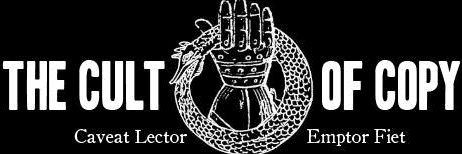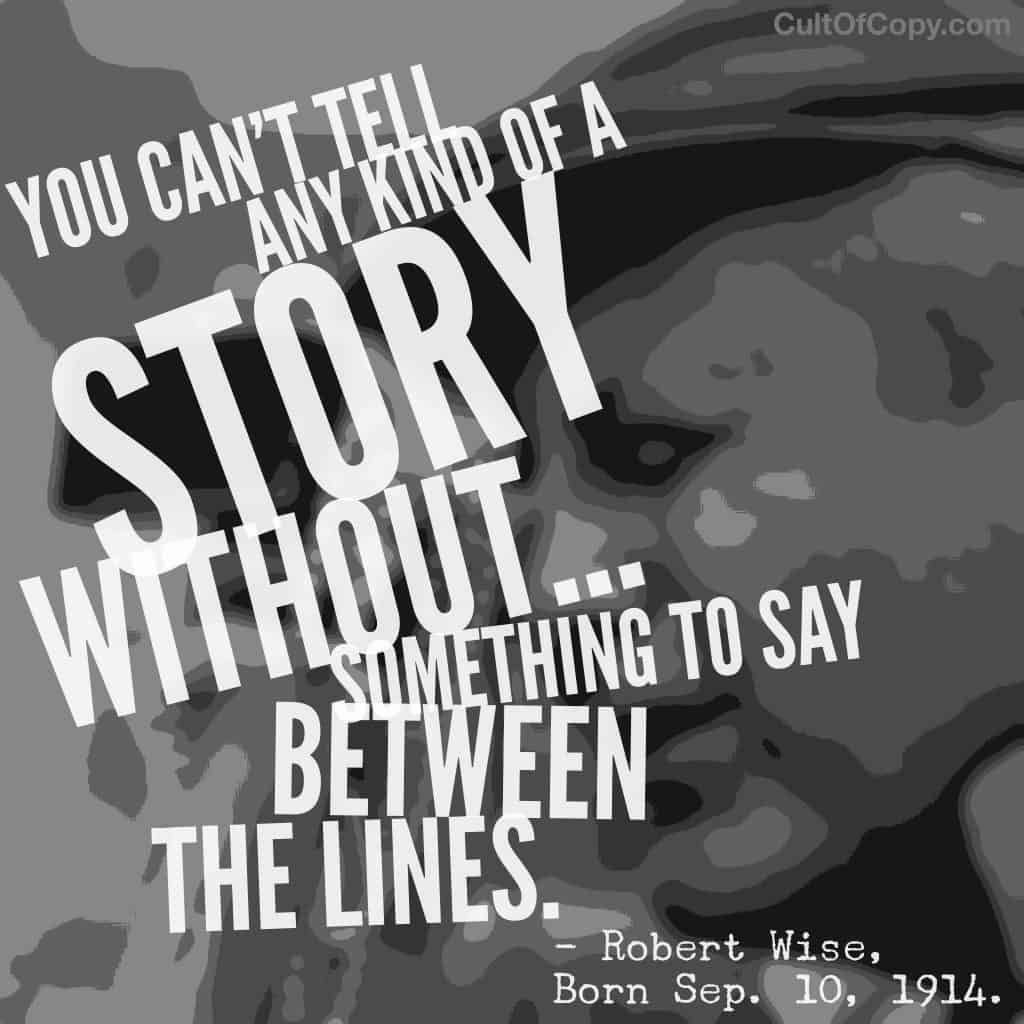“You can't tell any kind of a story without having some kind of a theme, something to say between the lines.” – Robert Wise, Born Sep. 10, 1914.
“Storytelling” has been a buzzword in marketing for a few years now. I've taught two courses myself, focused on using story to sell.
But this is something a lot of copywriters misuse or misunderstand. A story isn't just there to decorate an offer for a product or service. It's there to transmit something important, and it does so in a format humans find irresistible.
The thing we want to convey in any sales “story” is that transformation is possible, and we have the prescription for it. Whatever story you tell, however you frame it around what you sell, this must be the heart of it.
The characters and setting and conflict are all there not for themselves, but because they create a scenario in which the PROSPECT learns something about THEMSELVES and their OWN LIFE.
Which is what all good stories do. You think it's about one thing, but it's also about the reader. There is a theme which the reader is meant to grasp and find a parallel – a lesson of sorts about the world and their place in it.
Parables and fables are the most directly allegorical of these kinds of stories, being bludgeoningly blatant about the “moral” that you're meant to glean.
But many great stories are much more subtle.
“The Lord of the Flies” is a story where some young boys get shipwrecked on an island and have to make a society for themselves in order to survive. But that's not what the book is ABOUT. Its about the nature of power, and how it influences us whether we wield it or are subservient to it.
“Moby Dick” is the story of a whale ship captain who hunts a specific beast more out of revenge than personal concern. But it's really ABOUT the danger of obsession and vengeance and the cost it can extract from a person who becomes possessed with it above all other motivations.
And we could be here all day, talking about themes and making our English teachers proud…
But let's talk about using stories to make money.
The THEME we use for that again and again is what I said before: Transformation is possible, and we have the prescription for it. Keep that theme in mind every time you open your mouth or aim your keyboard at the brains of your buyers.
Every story you tell about you and your work, your clients and their problems, your friends and your adventures together, whatever it is – the pieces must all line up around the theme.
Show them the transformation. They become a new person when they recreate your story for themselves. The don't just get a thing. They are literally CHANGED.
They get to become a different person. A person who has had their problems solved. Their obstacles circumvented. Their successes achieved. Their dreams fulfilled. Their enemies driven before them. Etc. etc.
That's the theme of every story that actually SELLS.
Transformation is possible, and I have the prescription.
And look, it's okay if you don't grasp this now. I used to be the same way when I started out. I quit my last job and went freelance and was flying by the seat of my pants. Every project, every client, every successful launch was a potential story that I could use to convince my future clients to hire me.
But how? What was the way to sift out what MATTERED so I could deliver it effectively? What useless details could I ignore and leave out to keep the stories lean and swift?
I had no idea. Until I read an old dusty book by a long dead expert, whose words have never been recreated in a digital form. They changed the way I looked at using stories to promote my services and products, and I discovered it by accident…
But you don't need a random encounter with a dead author and cracked glue and disintegrating leather bindings. Because you've met me, and I'm more than willing to tell you the secrets inside.
Are you interested? (Silly, but simple. You get it.)


I just can’t believe I fell for that trick at the end. I was almost shooting an email to ask for the book’s title only to find out it wasn’t real.
That’s solid proof that stories can change the game for businesses.
Thanks for the masterpiece
Hi Colin,
I'll read this post everyday for a while.
It really is a "secret" and it's empowering to have it.
P.S. I hoped that someone else asked you already what was that book you mentioned but I see I have to do this myself. Could you please share the title? Thanks.
Sorry to reveal to you that there is no book. That is simply a demonstration of how compelling a story can make something. It hooks people into a narrative structure that makes details become meaningful. It creates a desire for closure. Even when it’s just made up. 🙂
Many people did email me back to ask about it, but you’re right that you’re the only blog commenter to ask! So thanks for letting me close that loop.
I've started to look forward to your emails. Recently I created my website offering Copywriting services. I've started writing tech blog posts as another way to monetize my website and showcase my writing too. Writing blog posts with a story framework will certainly bring more appeal to it. I'm going to work on this for sure. Thanks Cult master. 🙂
Really concise and helpful. Makes me really think critically about the transformation I'm selling. Thank you, Colin.
This answers a question "what does being 'relatable' mean" in that people do want "transformation" (unless they are already 100% happy with everything) so they are interested in reading something they can relate to that gives them hope and confidence they could actually achieve the transformation they lack. They aren't looking to relate just to feel validated or not alone…they want to feel like transformation could be theirs…. and a story can show them that possibility.
Love this one – Transformation is possible, and we have the prescription for it.
Thank you for that.
Thanks so much for the comment! I appreciate your readership. 🙂